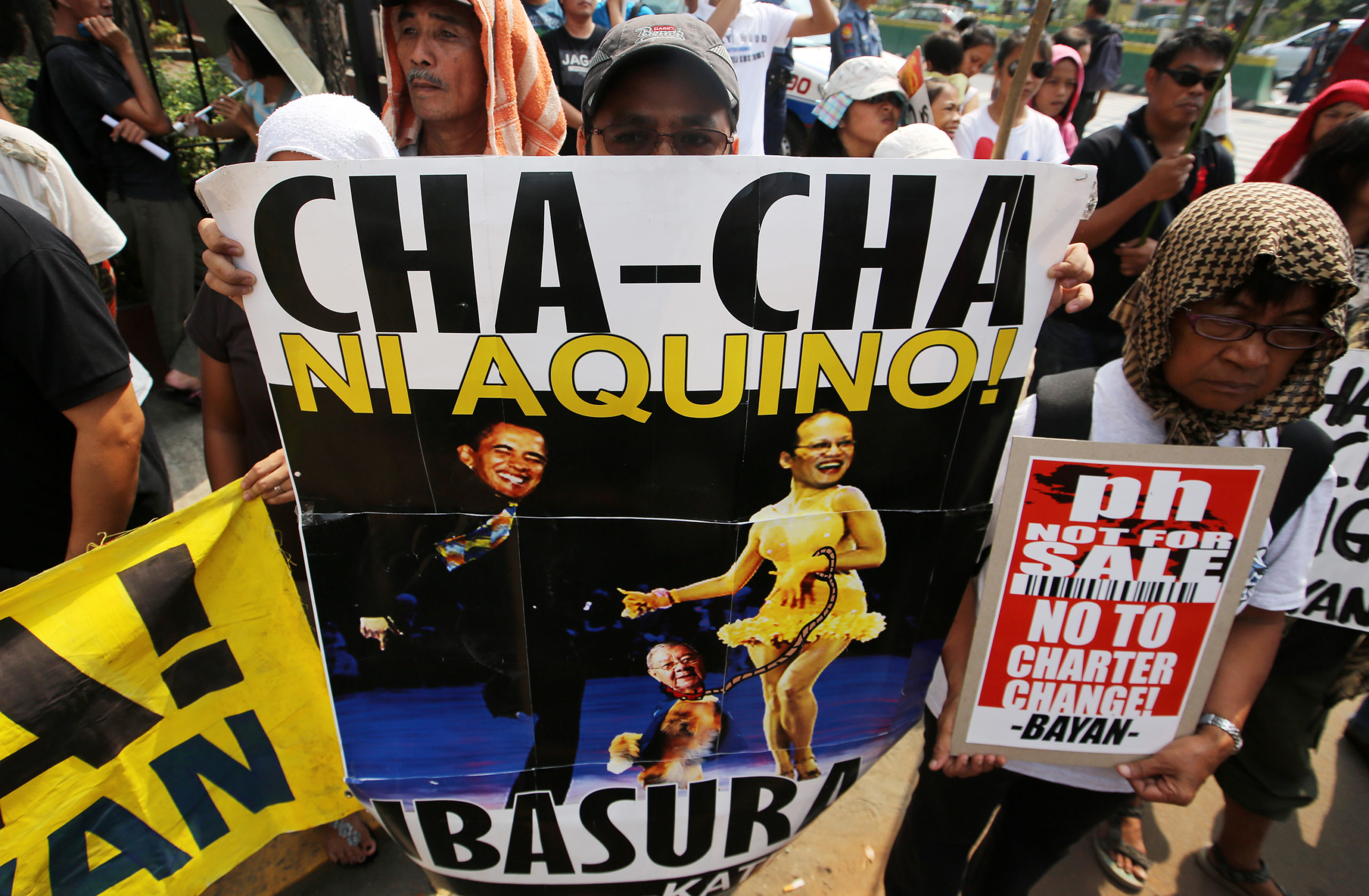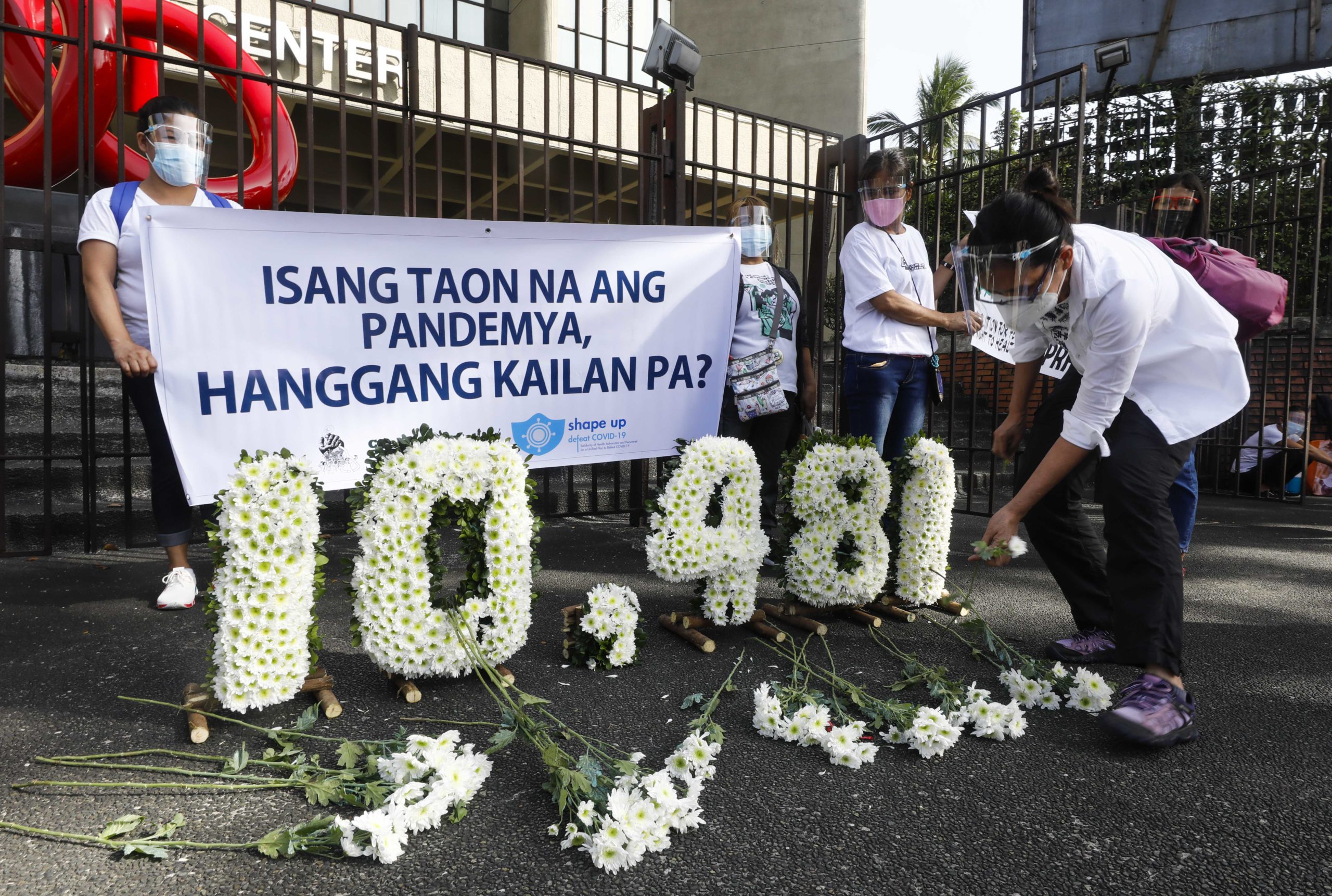A political dance appears to be approaching its conclusion in the Philippines. The country’s lawmakers, however, remain fiercely split on how the grand finale should play out.
Allies of President Rodrigo Duterte want to amend the constitution in a process known as the ‘Cha-Cha’, or charter change. Seen as a long-shot, last-ditch effort before the President’s term ends, advocates say the amendments will be strictly limited to economic provisions to open up more Philippine sectors to foreign direct investment – a lifeline for the pandemic-battered national economy.
But critics fear the Cha-Cha process is too open-ended and leaves the Constitution vulnerable to further amendments, such as eradicating political opposition groups from Congress and changing the term limits of elected officials. Questions also linger over how exactly Congress should vote on the amendments, which may leave the process gridlocked in the coming months.
With debates on the changes set to commence in Congress later this month, many Filipinos will be watching closely to see how lawmakers react to this latest constitutional gambit; the implications of which could have major consequences for the country’s political representation system – as well as the integrity of democracy more broadly – for years to come.
Maligned by some for being too inflexible, the 1987 Constitution included strict provisions which fenced out foreign entities from owning land and managing certain enterprises. Several administrations over the past three decades have attempted to pass amendments to ease these restrictions, but no proposal has ever made it through Congress.
Barry Gutierrez, a former law professor from the University of the Philippines and spokesperson for Vice President Leni Robredo, said in an interview with the Globe that charter change proposals have historically always been met with caution; not because of the specific proposals, but the general longstanding distrust of government in the Philippines.
A previous Cha-Cha push by Duterte in 2018 gathered notable pace – as well as controversy in tow – before grinding to a halt amid widespread criticism and lack of support. That same year, Duterte formed a ‘consultative committee’ composed of experts to draft a charter change proposal, with the main thrust being to shift the country from its current unitary state of government to a federal system.
But when the draft hit the floors of Congress, lawmakers added their own proposed amendments which included eliminating term-limits for some lawmakers and tinkering with anti-dynasty provisions.
Despite the new proposal being junked by the Senate, the exercise exemplified just how fraught the Cha-Cha path is, with Gutierrez believing that the president’s previous Cha-Cha attempt only further discredited lawmakers and “sowed deeper seeds of scepticism”.
“When it comes down to it, there will always be people with vested interests who hijack the process, and we ultimately end up with something completely different from the proposed intent that was originally avowed,” said Gutierrez.

The one-liner amendment
Three years on from Duterte’s last constitutional dance, renewed calls for change come amid unprecedented economic times in the Philippines, with some lawmakers now saying that Cha-Cha is necessary to slingshot the country from its Covid-induced financial abyss.
Proponents say that constitutional amendments could serve as an advantageous path to increase foreign direct investment in the country. But given the major political and logistical hurdles involved with Cha-Cha, critics say there are far more immediate and practical ways – which some have called “low hanging fruit” – to help the dire economic situation, including tax incentives and rolling out new stimulus packages to restore the economy to a level of relative normalcy.
But now, led by Duterte ally and Speaker of the House of Representatives, Lord Allen Velasco, Cha-Cha supporters are proposing a one-liner amendment, adding ‘unless otherwise provided by the law’ to lines within the Constitution.
This change is geared to open up a swathe of Philippine sectors – including oil and gas exploration, mining, education and mass media – to foreign management and control, and increase foreign direct investment.
With the latest Cha-Cha gathering pace, a resolution penned by Velasco himself – known as the “Resolution of Both Houses No.2” (RBH2) – outlines the revisions being proposed, including assurances that both the House and the Senate will approve amendments only related to economic provisions, in an attempt to alleviate critics’ concerns.
Despite RBH2 being approved by the House committee earlier this month – setting the stage for debates on Cha-Cha in the House of Representatives in the coming weeks – there still remains a long road ahead before any substantive changes can actually occur. The next step involves convening a Constituent Assembly, known as a “Con-Ass,” which brings together all members from both the House and the Senate to vote by a three-fourths majority before the process can move to the final hurdle, a national plebiscite.
If pursued, the unprecedented change could effectively banish a range of leftist political organisations from Congress, who have long denied the president’s claims of trying to topple his administration
Gutierrez, however, says that despite assurances that lawmakers will only deliberate on economic provisions, once a Con-Ass is convened, all parts of the Constitution are vulnerable to changes.
“Once lawmakers convene as a Con-Ass, it’s going to be very difficult to restrict discussions to just economic provisions – there are too many people with ulterior motives,” he said.
“It’s like taking your car to the shop to have your muffler fixed. But when the mechanic opens up the engine, he says ‘Oh, I see you also have a problem with your spark plugs, and you also have a problem with your brake pads, so let’s go change them’.”
Defending the move, Senate President Vicente Sotto III told TV5 last month that the push for ‘economic Cha-Cha’ was effectively immune from abuse by lawmakers, due to the assurances mapped out in RBH2.
“We can only pass [the one] particular line, so nothing can be more airtight than that – a one-liner amendment to the Constitution,” claimed Sotto.
However, attorney, law professor and former dean at Ateneo de Manila University, Tony La Viña, does not believe this to be entirely true.
“Congress, acting as Constituent Assembly, has the power to approve any amendment or revision of the Constitution,” he said, adding that a Con-Ass is beyond oversight and would not be bound by any previous agreements or resolutions like RBH2.
A potential ulterior motive behind this Cha-Cha that is of particular concern for opposition lawmakers is the threat of abolishing the party-list representation system.
Under the constitution 20% of all seats within the House of Representatives are allocated to party-list groups that often represent marginalised or underrepresented sectors in society, including labour, urban poor, peasant, indigenous people, or womens’ organisations, among others.
The president has long-believed some leftist, party-list groups are fronts for the Communist Party of the Philippines and its armed wing, the New People’s Army (NPA). After the dissolution of peace talks between the Philippine government and the NPA in 2017, following a 50-year-long civil war, Duterte has accused party-list groups and left-wing organisations of trying to ‘overthrow the government.’
In January, Sotto, as well as other political insiders, told Rappler that Duterte wanted lawmakers to look into the possibility of removing the party-list system entirely from the Constitution in order to solve their perceived communist problem.
If pursued, the unprecedented change could effectively banish a range of leftist political organisations from Congress, who have long denied the president’s claims of trying to topple his administration. Many of the groups have been highly critical of Duterte’s “War on Drugs” – as well as other purported human rights abuses that have occured under his watch – and if they were to be unseated from Congress, this would leave a representation-gap in the House of Representatives, already dominated by upper-class, wealthy politicians.

Running down the clock
With the end of his one-and-only term approaching in June 2022, Duterte and his allies are now working against the clock to make this Cha-Cha a reality.
Proponent lawmakers have recently claimed that the Senate and the House can vote as a single unified body on the amendments, believing the Constitution is vague on how a Con-Ass should vote. This would mean that members of the House – where Duterte has a super majority – would heavily outnumber the Senate, where a majority of Senators have been staunchly opposed to any changes. In this instance, any amendments would surely pass with the needed three-fourths majority.
La Viña, however, believes the Constitution is clear on how Congress should vote.
“It is not vague; the Constitution created a bicameral legislature which should always vote separately, unless a provision says [otherwise],” he said.
Opposition lawmakers and netizens alike have also criticised the administration’s timing for Cha-Cha, given the country continues to buckle under the weight of the Covid-19 pandemic, which has killed more than 11,000 people and plunged millions into abject poverty. What’s more, figures in the business community have voiced skepticism that constitutional changes would play a meaningful role in addressing the country’s more immediate crises.
In a statement last month, the Financial Executives Institute of the Philippines (FINEX) weighed in, saying that while economic revisions could benefit the country in the future, the institute was strongly opposed to any amendments at this time.
“It is akin to undertaking house renovation while the family struggles to pay for food, basic education, hospitalization expenses, and other badly-needed basic necessities,” the statement read.
Looking ahead, if the Cha-Cha amendments were to make it through Congress in the next 6-12 months, Duterte’s allies have outlined a plan to hold a national plebiscite on the changes alongside the 2022 presidential election. Duterte currently enjoys a 91% approval rating, so the prospect of a favourable, three-fourths majority vote in a national plebiscite on Cha-Cha would be a potential possibility.
While the survey results were criticised by some for being biased and potentially not fully reflective of public sentiment, opposition legislators would prefer for this latest Cha-Cha attempt to die in Congress. Gutierrez believes that may just happen.
“Regardless of any disagreements on voting separately or together, I just don’t think there’s enough time to get this over the line. Also, there’s every chance that someone will contest this Cha-Cha process in the Supreme Court – by the time that’s resolved, the clock would have run out,” he said.


